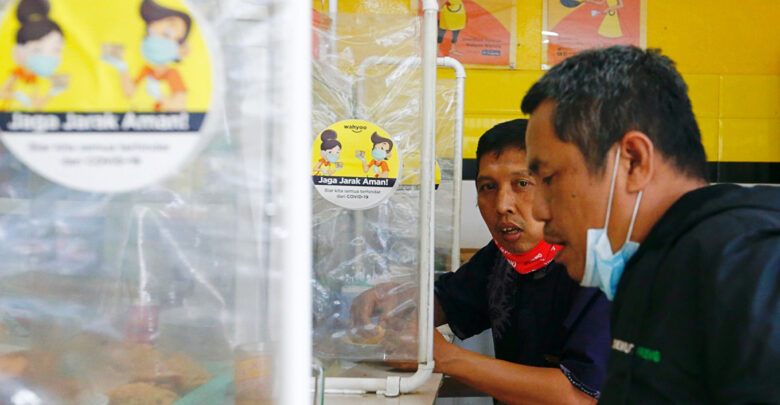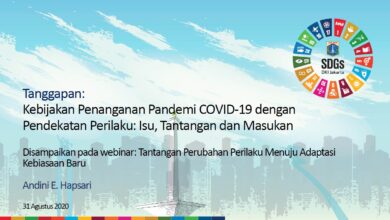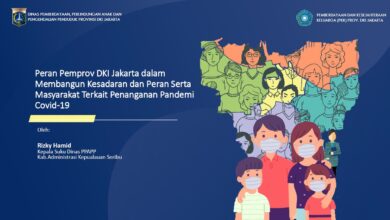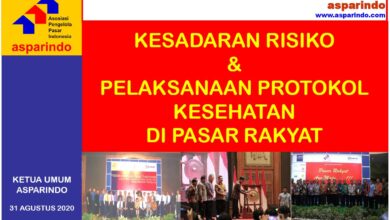
Several nongovernment organizations have launched initiatives to encourage people to protect themselves and their communities from COVID-19 in Jakarta, the country’s first epicenter of the pandemic and which is still confronting an increasing number of new cases.
The outbreak in Jakarta, with confirmed cases totaling 26,162 by Monday, persists but the number of people exercising self-restraint seems to be in decline, according to the Jakarta Public Order Agency (Satpol PP) after recording an increasing number of violations of health protocols in public.
Experts have attributed the lack of awareness and discipline in following health protocols among the public to a poor communication strategy by the relevant authorities.
A recent survey by the Lapor COVID-19 community movement and Nanyang Technological University’s Social Resilience Lab revealed a lack of concern by Jakartans about COVID-19 risks. The survey polled 154,471 people from all walks of life in Jakarta.
Community unit (RW) 05 in Kalibata, South Jakarta, was declared a COVID-19 “red zone”, or high-risk area, not long after it recorded the first two confirmed cases in May. Residents were quick to impose what they described as a local quarantine by limiting access to the area.
Despite these attempts, they actually had no idea about the dos and don’ts at the time, a representative said.
“Two cases were reported just after the community’s COVID-19 task force was established. We [the task force] were confused about what to do, let alone the residents,” Halimah, a member of the RW 05 task force, said in a virtual public discussion on Thursday. “People kept asking but we could only tell them to stay at home as per the government’s instruction.”
The overabundance of fast-moving COVID-19 information, some accurate and some not, overwhelmed the rather independent local task force, prompting it to seek help from professionals. It was only until recently that Halimah got a chance to contact a person from international humanitarian NGO Médecins Sans Frontières (MSF).
MSF Indonesia eventually stepped in by holding 10 meetings in June and July to help the locals learn basic information about the outbreak — each session lasted two hours and involved a small group of 10 participants to ensure strict social distancing.
Halimah said many of her neighbors now had a better understanding of the disease thanks to the interactive learning method the MSF offered.
“They [the participants] are now sharing what they have learned with others. People may be bored with staying at home for too long. But from what I have seen so far, people in RW 05 always wear masks each time they go outside,” she said.
MSF Indonesia deputy medical coordinator and an instructor of the RW 05 program, Dirna Mayasari, said that before and after the sessions, participants filled in questionnaires aimed at discerning how they perceived the disease. The questionnaires included simple questions such as their thoughts when first hearing about COVID-19 and whether they feared catching the disease.
“At first glance, that [questionnaire] might just be an ordinary thing. But we believe it helps people change their behavior toward the disease,” Dirna said. “For instance, Puskesmas [community health center] officials said more people showed up for the rapid test. Rapid testing was once quite an issue because residents worried that they might test ‘reactive’ [indicating virus exposure].”
“Now we are thinking about what needs to be addressed next,” she added.
Another international humanitarian organization Islamic Relief has also taken part in an independent health education program for people living in three subdistricts, namely Karet Kuningan and Kalibata in South Jakarta, as well as Dukuh in East Jakarta.
The organization conducted a door-to-door session, in collaboration with Jakarta-based nature lovers community TRAMP and local volunteers as facilitators.
The program indicated that even after five months, many people still had different levels of understanding about the disease, said Deddy Darmawan, a hygiene promotion specialist at Islamic Relief Indonesia, who is also a member of the Jakarta branch of Indonesian Public Health Specialist (IAKMI Jakarta).
Even though some people were aware of the disease, others were still reluctant to receive information from the facilitators. “Hence, we try to educate them by showing examples related to their daily lives,” he told The Jakarta Post.
The house visit program ended on July 20 but the team is mulling over an evaluation to assess “how far this intervention has benefited people”.
“Behavioral changes need time […] but at least the evaluation will ask whether they still remember and practice the message conveyed,” he said.
A local volunteer in the program, Tince Sudartini, 62, told the Post that she observed that some neighbors were more aware of the disease after her visit.
Tince, as someone from an age group vulnerable to the disease, said she hoped people would never underestimate the disease and that everyone would implement health protocols.
Penulis/Editor : Sausan Atika, The Jakarta Post
Foto Cover : Two men eat at a food stall in Jakarta on July 28, after the government eased restrictions imposed due to the outbreak of COVID-19. (REUTERS/Ajeng Dinar Ulfiana)



